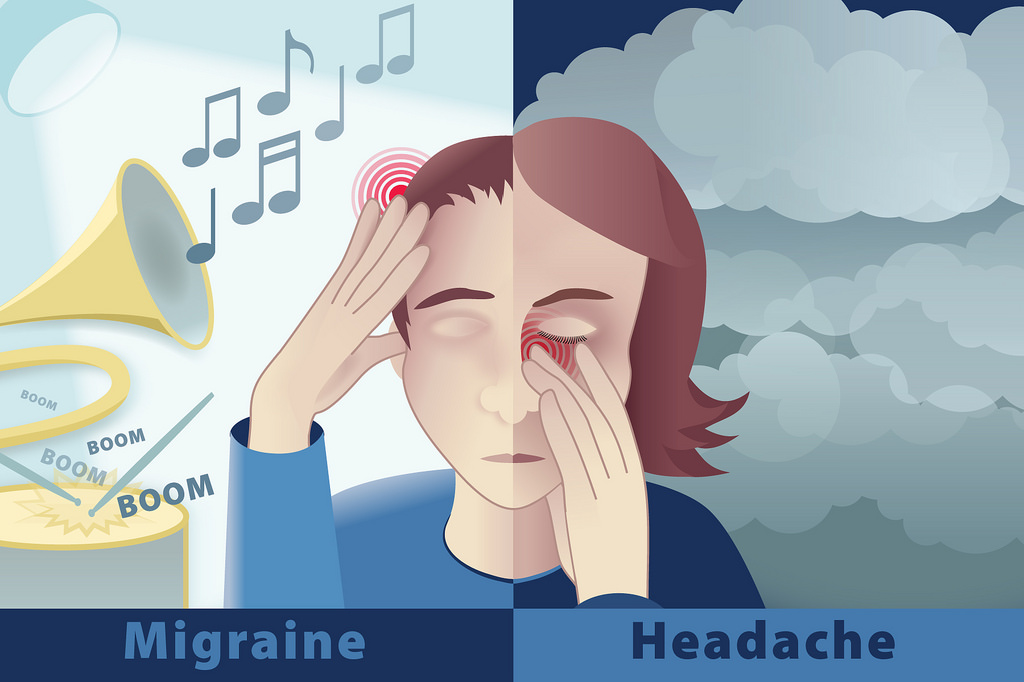By recent ASU nutrition student Alysia Nelson
Part of an ongoing series of articles on the Ketogenic Diet
Although the ketogenic diet has been around for many years, new research into this diet shows many benefits on the body. Findings of this diet lead to a new hope for migraine patients, nonetheless encourages many patients to experiment. Migraines are known to have a distinct correlation with food as certain foods can become triggers for an attack.1 Can a ketogenic diet be the cure to ending migraine attacks?

In a ketogenic diet, the body stimulates the production of ketones, a chemical that breaks down fat to use for energy instead of glucose (sugar).1 While a typical diet remains high in terms of carbohydrate intake, the ketogenic diet restricts the amount of carbohydrates putting the body in a natural metabolic state called ketosis.1 Sugar (glucose) is the main source of fuel for the brain to carry out everyday functions. In a ketogenic diet, fat becomes the new source of fuel since glucose levels lower without the presence of carbohydrates.1 Migraine sufferers are often prescribed glutamate (neurotransmitter) blockers to reduce the high concentrations found.1 Ketosis naturally blocks high concentrations of glutamate using ketones, creating the perfect formula for migraine patients.1
In an article in the European Journal of Neurology, migraine improvement was seen during a short time in ketosis.2 In the study, 96 overweight female migraine sufferers were enrolled in a diet clinic were (blindly) 45 received a ketogenic diet and 51 received a normal diet. Throughout the trial attack frequency, the number of days with headaches, and tablet intake were assessed. The results were as followed: in the group receiving a ketogenic diet, attack frequency, the number of days with headaches, and tablet intake reduced significantly.2
Cherubino Di Lorenzo M.D. was involved in the trial and wrote a paper that studied the effects of a ketogenic diet. Di Lorenzo confirmed that ketones are used as a replacement form of fuel for several cells including neurons (brain cells).3 He pointed out that the use of these ketones provided more energy than glucose combined with less oxidative stress creating a more efficient brain and muscle team.3 This efficiency is beneficial to migraine sufferers because ketones have anti-inflammatory effects, dampening the neural inflammation in migraine patients while modifying the firing rate of neurons (cortical excitability) that lead to migraines.3
More research is needed to confirm a ketogenic diet as a treatment plan for migraine sufferers. However, overwhelming evidence of the benefits of a ketogenic diet makes it possible that those experiencing migraines can benefit from this diet. The hardest part of a ketogenic diet is avoiding carbohydrates, a macronutrient that exists so heavily in the food we eat. While it can be difficult to avoid them, a methodical plan developed by you and your doctor can create long-term success. As always, you should consult your doctor before making any drastic changes to your diet.
1 “The Migraine Relief Center Blog.” Ketogenic Diets and Migraines: What You Need to Know, blog.themigrainereliefcenter.com/ketogenic-diets-and-migraines-what-you-need-to-know.
2 Lorenzo, C. Di, et al. “Migraine Improvement during Short Lasting Ketogenesis: a Proof‐of‐Concept Study.” European Journal of Neurology, Wiley/Blackwell (10.1111), 25 Aug. 2014, onlinelibrary.wiley.com/doi/abs/10.1111/ene.12550.
3 ResearchGate. “Less Carbs, More Fat: Ketogenic Diet Makes Migraine Patients’ Headaches Disappear.” The Huffington Post, TheHuffingtonPost.com, 28 Oct. 2017, www.huffingtonpost.com/researchgate/less-carbs-more-fat-ketog_b_12672220.html.
Editor’s Note: Fill Your Plate neither endorses or supports this type of diet, but encourages readers to always consult with your doctor regarding special diets. This series shares one nutrition student’s experience with the diet.

